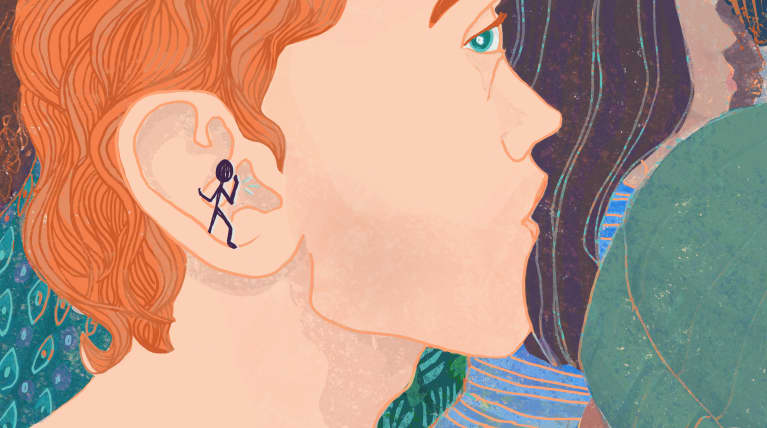I Hear Voices In My Head. Here's What It's Actually Like
Written by Charlie Ross
As told to Emi Boscamp:
A few months ago, I told a classroom full of people that I hear voices. The voices come from a black stick figure right behind my right ear. Normally, he just sits there. He can even be calming sometimes. But other times, he turns into a monster and takes over my brain.
"Hey," I'll think, "your shoe is untied. Why don't you go tie it?"
"No, why don't you go kill yourself?" comes the response.
The professor of my leadership class had asked us all to tell a story, so I told them my story. My entire story. My professor cried. People looked at me like I was crazy. And, technically, I am — but I wouldn't trade it for anything. It's made me a better person.
I want to tell you my story too.
I am diagnosed as having bipolar disorder type II. I experience earth-shattering highs and exhausting, suicidal lows.
I'm a 22-year-old college student from Connecticut. My father passed away in 2014 after a two-and-a-half-year battle with cancer. I was super close to him. I didn't know it at the time, but about four years ago, right after I heard he was going to die, I had a full-blown, long-term manic episode. I never felt tired, even after getting only a couple of hours of sleep every night, and I always felt like I was on an important mission. I felt superhuman, invincible. Everything shone brighter. But it was an unhealthy, unsustainable way of living.
A few months later, I crashed into very severe depression. I had suicidal thoughts. Well, the friend in my head told me suicidal things.
"You're worthless."
"You shouldn't go to class."
"You should kill yourself."
Sometimes, he didn't even form words. He would just scream. That's when I knew it was really bad.
But it got even worse than that. Aside from hearing things, I would see things that weren't there, too. A white, pulsating orb took residence in my head at times. And once, on a trip to Boston, I saw people jumping off buildings and tapping on my car window.
Mostly, though, in my times of deep depression, he would just whisper discouraging things to me.
A few months ago, I told a classroom full of people that I hear voices. The voices come from a black stick figure right behind my right ear. Normally, he just sits there. He can even be calming sometimes. But other times, he turns into a monster and takes over my brain.
"Hey," I'll think, "your shoe is untied. Why don't you go tie it?"
"No, why don't you go kill yourself?" comes the response.
The professor of my leadership class had asked us all to tell a story, so I told them my story. My entire story. My professor cried. People looked at me like I was crazy. And, technically, I am — but I wouldn't trade it for anything. It's made me a better person.
I want to tell you my story too.
I am diagnosed as having bipolar disorder type II. I experience earth-shattering highs and exhausting, suicidal lows.
I'm a 22-year-old college student from Connecticut. My father passed away in 2014 after a two-and-a-half-year battle with cancer. I was super close to him. I didn't know it at the time, but about four years ago, right after I heard he was going to die, I had a full-blown, long-term manic episode. I never felt tired, even after getting only a couple of hours of sleep every night, and I always felt like I was on an important mission. I felt superhuman, invincible. Everything shone brighter. But it was an unhealthy, unsustainable way of living.
A few months later, I crashed into very severe depression. I had suicidal thoughts. Well, the friend in my head told me suicidal things.
"You're worthless."
"You shouldn't go to class."
"You should kill yourself."
Sometimes, he didn't even form words. He would just scream. That's when I knew it was really bad.
But it got even worse than that. Aside from hearing things, I would see things that weren't there, too. A white, pulsating orb took residence in my head at times. And once, on a trip to Boston, I saw people jumping off buildings and tapping on my car window.
Mostly, though, in my times of deep depression, he would just whisper discouraging things to me.
In terms of mental health, people need to understand it's not a binary of "diagnosed" and "healthy."
The last time something like that happened was this past winter. Sometimes, on especially stressful days, the voices come back, but for the most part, they're gone. Now, months later, I know those suicidal thoughts are nothing but a reaction to the pain I've experienced. I don't want to kill myself at all. I'm friends with that little monster. I just have to take care of him a little more and he won't be mean.
How do I take care of him? It's a combination of therapy, meditation, and medication. I spend as much time outside and with my friends as I possibly can. I meditate for 20 minutes using Sarah Seidelmann's drumming tape whenever I'm feeling really stressed or out of control. I sleep more than the average person (between eight and 12 hours a night) and, as hard as it is for a college student, I try not to party as much as I used to.
These things have done wonders for me, but there is so much more to figure out. I've had to figure myself out — what works and what doesn't. It's been a painful process, to say the least. But I wouldn't want it any other way. Honestly. The relationship I have with myself now is so much more in-depth and spiritual. I understand the world in a much better way. I'm more empathetic. My "disorder" has made me really appreciate the relationships I have. When I was first dealing with it, it was obviously really difficult, but it's only enriched my life.
Now I've made it my mission to smash the stigma around mental illness into a million little pieces. It's awful: Doctors have told me not to tell people I'm bipolar, especially in job interviews. This kind of message forces people who deal with self-harm and suicidal thoughts to hide in the closet. They think something's wrong with them and are petrified to talk about it. But "coming out of the closet" was the best thing I could have ever done. I can connect with people so much better now.
The condition is an illness — a label — and it's something that doesn't define you. What's more, it can be an extreme gift. The more you can use it to relate to other people and yourself, the better you'll understand the world. In terms of mental health, people need to understand it's not a binary of "diagnosed" and "healthy." Everyone is connected. Everyone's been through something. The more connections we can establish, the less alone people who are struggling will feel. Connection,
These things have done wonders for me, but there is so much more to figure out. I've had to figure myself out — what works and what doesn't. It's been a painful process, to say the least. But I wouldn't want it any other way. Honestly. The relationship I have with myself now is so much more in-depth and spiritual. I understand the world in a much better way. I'm more empathetic. My "disorder" has made me really appreciate the relationships I have. When I was first dealing with it, it was obviously really difficult, but it's only enriched my life.
Now I've made it my mission to smash the stigma around mental illness into a million little pieces. It's awful: Doctors have told me not to tell people I'm bipolar, especially in job interviews. This kind of message forces people who deal with self-harm and suicidal thoughts to hide in the closet. They think something's wrong with them and are petrified to talk about it. But "coming out of the closet" was the best thing I could have ever done. I can connect with people so much better now.
The condition is an illness — a label — and it's something that doesn't define you. What's more, it can be an extreme gift. The more you can use it to relate to other people and yourself, the better you'll understand the world. In terms of mental health, people need to understand it's not a binary of "diagnosed" and "healthy." Everyone is connected. Everyone's been through something. The more connections we can establish, the less alone people who are struggling will feel. Connection,


No comments:
Post a Comment